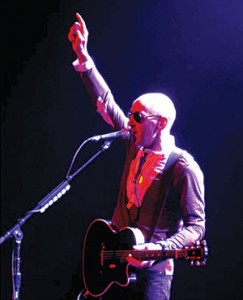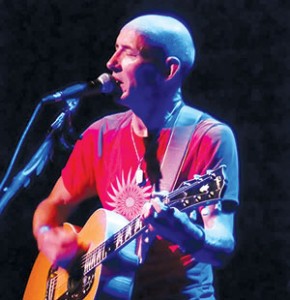
Simon Townshend does the family proud, exhibiting his own unique musical style and talent both on record and in concert. — Photo by Kathy Vantassell
By Blake Maddux
When Simon Townshend was born Oct. 10, 1960, his oldest brother, Pete, was five years away from becoming one of the most recognizable faces in rock ‘n’ roll. At 9, Simon contributed vocals to the song Smash the Mirror from The Who’s album Tommy. Six years after that, he appeared as a newsboy in the movie based on that album.
Having released his first album in 1984 (Sweet Sound), Townshend accompanied The Who’s lead singer, Roger Daltrey, on solo dates in the 1990s and began touring with his brother’s reunited band in 2002.
While these gigs have certainly garnered him plenty of exposure and some surely pretty paydays, the fact is that Simon Townshend, as a singer-songwriter, deserves more than just the attention that being Pete’s brother affords him. Granted, his solo efforts have been few and far between. However, 2012’s Looking Out Looking In was a major creative breakthrough, and Denial, which was released April 1, demonstrates that the youngest Townshend’s creative juices are still fully flowing.
Despite having being involved in a car accident two days earlier while driving home to London from Buckley, Wales, Townshend kindly kept his appointment to speak to The Somerville Times via Skype on the eve of his American tour, which will bring him to Johnny D’s Friday, April 12.
Blake Maddux: From where are you speaking to me?
Simon Townshend: My studio in London. It’s in the loft of my house. I had an extension put on a few years ago, and that’s where I recorded this album [Denial], actually. (Later in the interview, Townshend revealed that he lives in the house in which he was born.)
BM: How are you feeling after your recent car accident?
ST: I’ve got a sore neck, but other than that, I’m OK. I’m a bit shaken up. I was lucky I hadn’t had a drink or anything. I’m clean. I’ve got an insurance claim, and I should get a replacement vehicle. All good.
BM: I assume that you were raised in a creatively nurturing environment.
ST: My father was a fantastic musician. He was kind of the real musician in the family. He sight-read music, he played clarinet and saxophone and was promoted by the BBC as the best in the country two years running. I guess that Pete was very influenced by him. He used to go and watch him play jazz gigs. I had a small amount of that, obviously. My main influences were probably more Pete than my father. My brother, Paul, was playing music as well, but he drifted away from it. I was playing guitar at age 8. Once I was 10, I started playing piano for a few years, and then I went back to guitar when I was around 16 or 17. So I’m lucky, you know, I had those influences, and it kept me interested.
BM: What sort of personal taste did you develop in music when you were growing up?
ST: I was always influenced by singer-songwriters. I really got heavily into the American artists, like James Taylor and Carole King. And I also loved Elton John. Stevie Wonder was probably one of my biggest influences at a young age. I adored him. But obviously The Who were, from when I was very young, I was very influenced by them. I thought Tommy was probably the album that I was at an age where I could really identify with the music on that, and I understood it. Whereas perhaps previous to that, it was always just like the quirky stuff I used to like, like [The Who songs] Call Me Lightning and Dogs, things that were more obscure and more fun. As I grew up, I got more into singer-songwriters.
BM: Did both you and your brother, Paul, audition for the speaking role as Pete Townshend on The Simpsons episode A Tale of Two Springfields?

Simon Townshend takes the stage at Johnny D’s on Saturday, April 12. — Photo by Lori Hoddinott
ST: No. I was away touring at that time. Pete refused to do it. I think Roger (Daltrey) and John (Entwistle, The Who’s bassist) did theirs. Paul not only looks more like Pete than I do, but he sounds a little more like Pete, so he would’ve gotten the job over me anyway. Paul fit perfectly in it, and he still gets the royalty checks today, so he’s very happy about that!
BM: In his autobiography, Pete mentions leaving you “in David Bowie’s care” at the Royal Albert Hall when you were 8 years old. Do you remember this?
ST: I have a vague memory of that, actually. Pete told me about this. I started to remember a few years ago, I started to remember the time. Yeah, I sat on his knee and watched the concert, yes. Interesting, isn’t it? I think he’s a really nice guy, David, from what I know. I haven’t really talked to him since. I have met up with him, but we were working and Roger was there, and we didn’t get much of a chance to chat about that. I would love to one day talk to him about that and see if he remembers as well.
BM: How differently do you feel when playing before hundreds of people as opposed to thousands of people?
ST: I think when you play to a small club, you have an intimate connection that you’ve got to learn how to get on a bigger stage. On bigger stages, it did take me quite some time to start to feel that you can connect to the people at the back, even if it’s 50,000-capacity. It’s not easy at first, but now I consider myself incredibly lucky, because I’m doing both. I’m able to play a club, and then when The Who are on tour, I’m out with them on the biggest stages. I think the most important thing is to just relax, to talk, to connect with your personality. And I think some artists don’t realize how important that is. [The people are] hearing the songs, they’re hearing your personality in the music, but they do want to hear you as a person, as well.
BM: How did the writing and recording of Denial differ from 2012’s Looking Out Looking In?
ST: With this album, it kind of wrote itself. It’s a kind of family-driven record, isn’t it? We had so many problems. My son lost one of his children at birth, and then we had the problems with the addiction running through. My daughter had problems, and my brother, Paul, and his wife, they had problems. And I think it just sort of spilled out of me. I realized that one thing that you gotta do when you’re writing a song is if you’ve got something good, get it down quickly, because if you leave it for six months, when you come back to do it, it’s a totally different scenario. I was influenced by a comment John Lennon made, which is “write the song one day, record it the next, release it the next.”
BM: Is it true that you are close friends with Eddie Vedder of Pearl Jam?
ST: Eddie Vedder, well he’s a family friend, really. I met Eddie back when Jerry [Garcia] was still alive. He came up, and he and Jerry were talking about my album Sweet Sound. I was like, “Wow, these guys know my first album.” And then Eddie leaned over, put his lips to my ear and started singing one of my songs in my ear, something called Palace In the Air, and it was on Sweet Sound. You talked about the Looking Out Looking In album; he loves that record. He played the Still Love song at his daughter’s christening. He’s a good guy. I’ve spent a lot of time hanging out with Eddie in hotels.
BM: Finally, you know I have to ask: What is it like being the youngest brother of one of popular music’s greatest visionaries?
ST: A lot of people ask me that. It’s a weird one, isn’t it? In the early days, perhaps for me it was harder, because I was a young guy trying to make it in a band, and my big brother was in the biggest band in England and America. So, you know, it was probably difficult then. But Pete has always been incredibly helpful, and he wrote me the most incredible email tonight about my new album. I mean, he’s blown away by it. I have so much respect for him.
People say, “What’s it like being in his shadow?” I’m not in any shadow. To me it’s a freaking honor. I love being Pete’s brother. I’m very proud to be a Townshend.
Simon Townshend will be at Johnny D’s Friday, April 12. Doors open at 5:30 p.m. and the show starts at 7 p.m. Tickets are $20.















Reader Comments